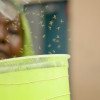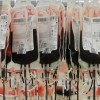Leicester and Melbourne - lockdown again
Interview with
The city of Leicester has been making the headlines this week. Unlike the rest of the UK that celebrated Super Saturday as the lockdown eased, there was no grand re-opening for their pubs; schools have been restricted to children of essential workers again, and non-essential shops have had to pull down their shutters, because, owing to a surge in coronavirus cases, the lockdown has been extended there. Nobody seems to be able to put their finger on precisely why Leicester has come top of the league for coronavirus cases this last month. The Department for Health and Social care said there were “multiple” factors causing the spike and that there were no quote: "care homes, hospital settings, or industrial processes” that would immediately explain the apparent rise in new diagnoses. But scientists say infections may reflect social inequalities: in places where there are more white collar jobs, employees can work from home and isolate from others. In more deprived areas, on the other hand, people are more likely to have to go to work and use public transport, raising their risk of becoming infected. Cambridge University’s Freya Jephcott studies disease outbreaks, so what does she make of the “longer lockdown” approach to controlling the outbreak in Leicester? Freya spoke to Chris Smith...
Freya - I think in general terms, we're already sort of on the right track. It's really about empowering local health authorities now - when we do see increased transmission in specific areas - to act in a way that they know is locally appropriate and also locally effective to contain it. Because the way outbreaks spread is obviously determined a lot by the population it's spreading in, the sort of density of the housing arrangement, the kind of industries they rely on for the economy there.
Chris - Do we actually know what is the right way forward though? In terms of when you have these sorts of combinations of factors, what the right thing to do is? Or is it going to be a learning exercise and different cities with different formats, different population groups are going to have to learn the hard way and then they'll know for next time?
Freya - Absolutely. Especially with such an unfamiliar and new virus, there is going to be a lot of trial and error, a lot of trying to learn from each other and also trying to look locally to see what's going to help. There is not going to be a one size fits all. And I think the fact that nothing is certain should be a bit reassuring in that there is discussion and research, and that's really what's required at present.
Chris - Given it is summer, and we know that viruses spread much less well in summertime when more people are out and about. We're also in the immediate aftermath of a lockdown when arguably the amount of virus circulating should be extremely low. Is it not rather worrying that we've got Leicester happening right now?
Freya - It's obviously concerning. I'm not sure whether we should see it as entirely surprising. There are a few features of a city like Leicester that would leave it a little more susceptible to ongoing transmission. What encourages me is that it was detected and that there is this discussion now of maybe some kind of local interventions that could come into control. There is something to be said for the fact that it is summer and there does seem to be less transmission that occurs when you're in open spaces. So maybe there is some kind of happier middle ground of opening up that is possible with something that sort of leverages the fact that we can be outside right now and not be rained on or chilly.
Chris - We've now got plans being laid for opening up the hospitality industry more, opening up air bridges to other European countries. What are your feelings on the direction of travel? Is it too much too soon, or do you think this is about right?
Freya - I think it's important in answering this question that I make it clear that my background is very much coming from the epidemiology anthropology side. I'm not an economist, I'm not a public policymaker as a rule, but from my perspective, it is worrying. I'm sure that there are ways that we can support hospitality industries to open up in a way that sort of mitigates the risk. And so I'm hopeful there. But the issues around international spread do concern me, not just the idea of importing cases into Britain if we get transmission even lower, which could trigger new ongoing transmission, but also the fact that we might be exporting cases to vulnerable places. We've not only got to think about risks to our country, but the role we play in sort of proliferating this outbreak globally too.
And speaking of the international situation, in Melbourne, Australia’s second biggest city, in the state of Victoria, the government there have imposed what appears to be a much tougher local lockdown than the one in Leicester. The finger in Melbourne is being pointed at security guards who’ve been blamed for a spike in cases by allegedly catching coronavirus through having sex with international travellers quarantined in a 5 star hotel in the city. Monash University’s Philip Russo spoke to Chris Smith...
Philip - The past 10, 11 days, we've had an increase of daily new cases of covid infection. The evidence has shown us that they're confined to a certain few suburbs in Melbourne. Some genomic testing has demonstrated that most likely they are due to a breakdown in infection prevention in the quarantine hotels that we put returning international travelers in.
Chris - What do you mean by that? There are people who were admitted to those venues and they've unfortunately spread it beyond them?
Philip - Returning international travelers are quarantined here for two weeks on arrival. And they've been put up in hotels, staffed by security guards who have been employed to ensure the travelers remain inside the hotel. But it appears as though the security staff haven't been following the infection control guidelines. The security guards have become infected and then subsequently taken it back to their areas of residence and into the community.
Chris - How many cases has Melbourne got now and over what sort of timeline?
Philip - About two weeks ago, we were having zero cases on a daily basis. And at the moment we're having in excess of around about 60 to 70 new cases per day. Which possibly doesn't sound like a lot. But then compared to the other states in Australia who are having zero to one or two cases on a daily basis for a number of weeks now, it certainly stands out.
Chris - What has been the reaction of the government to this?
Philip - The Victorian government has been very proactive in responding to this. And as of midnight tonight, Melbourne time, there are 10 suburbs around Melbourne who are going back to stage three restrictions. People in those 10 suburbs will only be allowed out of their houses for four reasons - essential shopping for food and supplies, caregiving, to exercise and to study or work if they can't do that from home.
Chris - And how long is this going to go on for?
Philip - So at this stage, um, the government is saying that this is going to continue on until at least the 29th of July, so about four weeks. But it's possible that if we continue to get an increase in new cases, that time frame may be extended. We are doing extensive testing in those suburbs, but also we have free testing across Melbourne. The likelihood is if we start to see cases outside of those areas, then the number of suburbs that go into that stage three restrictions might actually be extended.
Chris - It's a stark reminder isn't it? Because Australia has had a very good track record of dealing with Covid. The testing was very fast off the board, done at enormous scale, it's an outlier in that respect. And it just serves as a reminder that no one is above Covid.
Philip - And that's the message we're trying to get to the community here. On an international scale, we've done reasonably well, but the message we're trying to get across is that it's not over, this is a marathon. It's not a sprint. We're somewhere in the marathon. We actually don't know where we are. We might not even be halfway at this stage. And so what we're doing now, it's more than likely that we'll continue to see these clusters, these little outbreaks here and there, possibly up for the next 12 to 18 months. We're confident though that the amount of testing that we're doing and our public health response should be able to limit the spread of infection to a large degree.
- Previous Tree plantations and carbon capture
- Next How HIV infects females










Comments
Add a comment